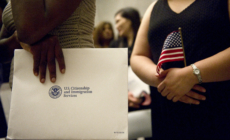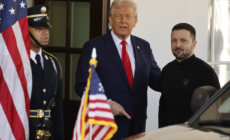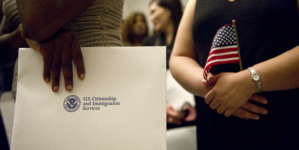-
Haiti’s Landmark Oloffson Hotel is Destroyed in an Apparent Arson Fire - 4 mins ago
-
Kamala Harris’ Comeback Hopes Take a Major Blow - 12 mins ago
-
US Immigration Backlog Hits All-Time High - 47 mins ago
-
South Korea Holds Its Chin Up as Trump Wields Tariff Threat - 48 mins ago
-
Couple Order ‘Non-Alcoholic’ Wine at Restaurant in Europe—Doesn’t Go Well - about 1 hour ago
-
5 Israeli Soldiers Killed in Gaza, Military Says - 2 hours ago
-
Donald Trump Sending More Weapons to Ukraine: What We Know - 2 hours ago
-
What to Know About P.O.W.s in Myanmar’s Brutal Civil War - 2 hours ago
-
South Africa Reacts to Trump Tariffs News - 3 hours ago
-
The Brothers Who Came Face to Face in Myanmar’s War - 3 hours ago
China Strikes Back Over US Tariffs Imposed by Trump
In response to the U.S. imposing a 10 percent tariff on Chinese imports which took effect Tuesday, China has announced its own set of tariffs on U.S. goods.
Starting February 10, China will implement a 15 percent tariff on American coal and liquefied natural gas, and a 10 percent tariff on crude oil, agricultural machinery, and large-engine cars imported from the U.S., according to a statement from the Chinese Ministry of Finance.
U.S. President Donald Trump signed an order Saturday seeking to levy significant tariffs on America’s largest trading partners, citing concerns over fentanyl flow and trade deficits.
A spokesperson for China’s U.S. embassy said, “The unilateral tariff increase by the U.S. seriously violates [World Trade Organization] rules and is a typical act of unilateralism and trade protectionism.”

Andy Wong/AP Photo
Trump’s tariff decision “undermines the foundation of China-U.S. economic and trade cooperation,” the spokesperson added.
Tariffs are taxes on imported goods, typically paid by the importing businesses, which can then pass costs onto consumers through higher prices. The importing business could be any American company that purchases goods from foreign suppliers and brings them into the country for resale, manufacturing, or distribution. Tariffs are often used to protect domestic industries by making foreign goods more expensive and encouraging consumers to buy locally.
This is a breaking news story and will be updated.
Source link


















